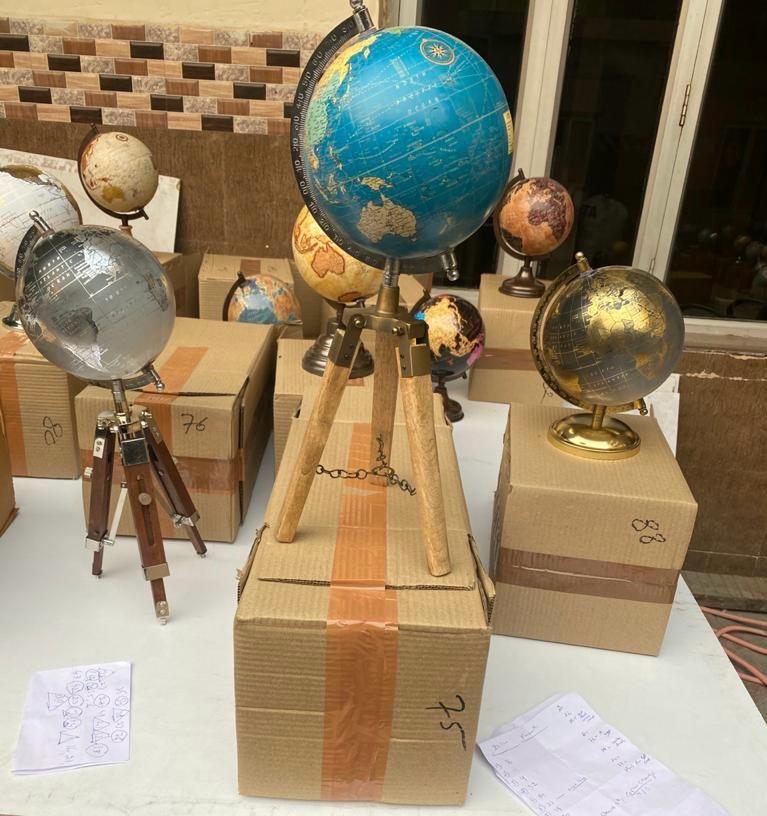
- 57% of Indian SMEs consider GCC, Mercosur, Africa, and UK for rerouting shipments to the US
- 27% of SMEs plan to revive non-US buyer enquiries despite lower price premiums
- Micro enterprises face order cancellations and supply chain challenges post-tariff imposition
Amandeep Budhiraja, owner of JustToyz, was exporting handcrafted globes to the United States before it imposed a 50% tariff on India. Now, Amandeep is exploring his options, including exporting pieces in semi knocked down or completely knocked down condition to Dubai, planning a trip to China to meet prospective partners and listing on Amazon Canada to circumvent having to pay these tariffs.
Pursuing any of these options will still cost Amandeep at least 20% more than what he was paying, accounting for the increased cost of logistics, double taxation and compliance to more regulations from these countries. But for now, these appear to be the best way forward. Amandeep is not as perturbed by his product becoming uncompetitive in comparison to other countries since competition for his product is not as much. However, he does believe that the higher cost will weigh on demand from the end consumer.

Hand-crafted globes for exports by JustToyz
While he admits that these options are not fool proof, he believes they are his best bet given the current scenario. Amandeep is not alone. 57% of the member enterprises who responded to a questionnaire by the India SME Forum, said that they are looking at using the countries in the GCC region, Mercosur, Africa and UK for rerouting shipments or value added transshipments to the US.
27% of the enterprises are looking at reviving buyer enquiries from Non-US regions even though they may have to compromise on the prices as the premiums received from the US market are higher for quality products.
16% of the respondents have stated that they are looking at outsourcing parts of the orders to enterprises in other countries in order to retain the buyers if the stalemate continues.
Vinod Kumar, who is on the governing board of the India SME Forum, said that the Forum has set up a help desk for its members post the imposition of the tariffs. Micro enterprises are facing greater challenges given that several of them are completely dependent on a handful of buyers, he explained, adding that a lot of member enterprises have been getting order cancellations, especially those working indirectly with medium and large exporters.
Not just sellers, buyers in the US too are facing difficulties as it is difficult for them too to source high quality products at these prices on such short notice. For instance, industries in the US importing chemicals are facing difficulties in keeping their supply chains running and facing difficulties finding suppliers which are able to provide composition and efficacy on such short notice, Kumar said.
Rahul Mehta, chief mentor at the Clothing Manufacturers Association of India, said that while transshipments were done very easily in the olden days, country of origin requirements mean that depending on the country and product, anywhere between 20% and 40% of the value add now needs to happen in the intermediary country.
"That's not so easy," quipped Mehta, adding that while large exporters can still explore these avenues for extended manufacturing or tie-ups, these might not be viable solutions for a majority of the MSMEs. "Nothing can really fully mitigate the impact of these tariffs," he added.
Some consolation can still be derived from the fact that most SMEs are not directly involved in transshipments because they are vendors of larger companies, said Manguirish Pai Raicker, chairman of the MSME Council. Others are looking at developing local markets and exploring major evolving markets such as Australia and New Zealand, he said.
While some MSMEs hope that that they can utilise opportunities from the domestic boost to consumption expected post GST rationalisation, the benefits will take time to accrue, Kumar believes.
Given the scope and pace of developments even within the US on the tariffs, this should be transient, Raicker too believes.
Essential Business Intelligence, Continuous LIVE TV, Sharp Market Insights, Practical Personal Finance Advice and Latest Stories — On NDTV Profit.























